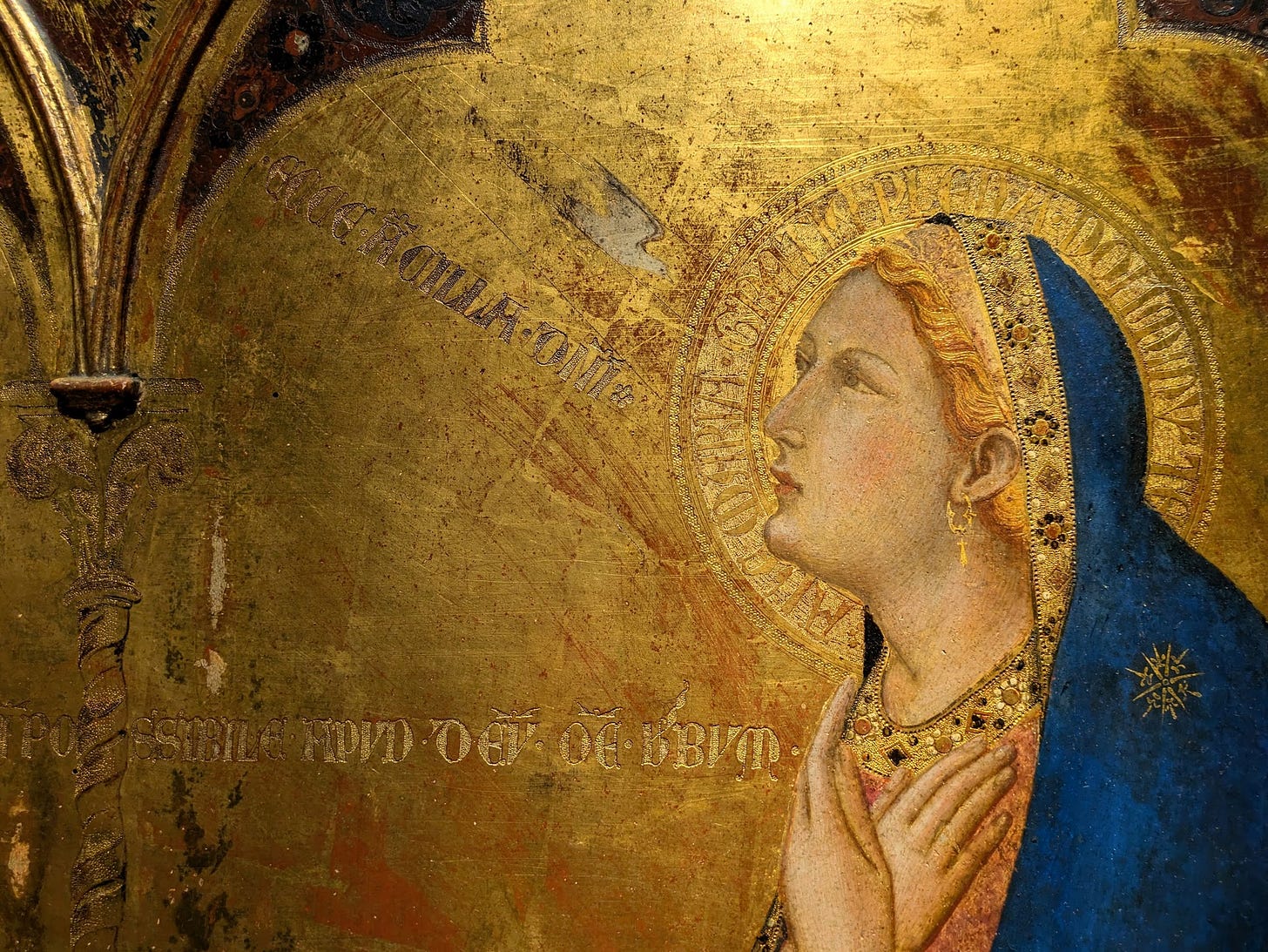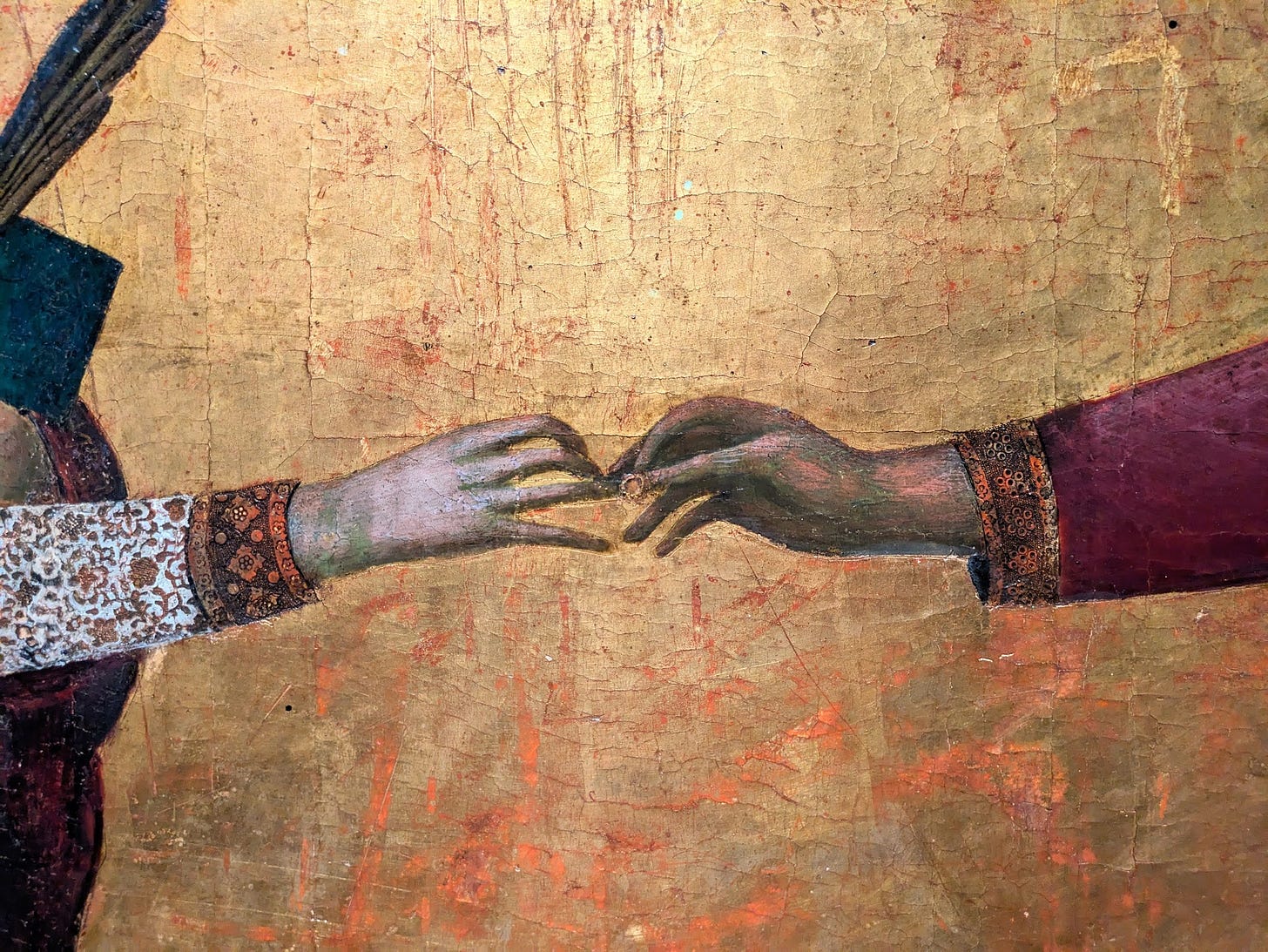Vision Board Edition
Berkeley and prayer, surrealism and dreams, Kandinsky and abstraction, the unlikely craftsmanship of a reborn Notre-Dame, and more.
Happy New Year friends!
I rarely make New Year’s resolutions. Knowing well my own interior multiplicity, the very idea of the persistence of the will across time is something of a mystery to me, though many in my life would consider me to be willful, or to have an above-average capacity for carrying out long-term projects. But what is the Will? What is the “I” that wields it? What happens when many “I”s struggle for the throne, who is it that adjudicates?
Saint Paul: “I do not understand what I do. For what I want to do I do not do, but what I hate I do.”
I caught up with an artist friend the other day. As we sipped our drinks in her living room, she showed me the fruits of her year: hundreds of watercolor paintings, abstract, flowing, gorgeous. She has been a photographer, but woke up one day and felt she was a painter. She was right. She held a pop-up art show in her backyard, sold forty paintings, made thousands of dollars, enough to keep her going on her shoestring budget. (Artists are almost as eager to talk about money as New Yorkers.)
She said she saw it all before it happened. The exact number of paintings sold. The exact amount of gross income. She made a vision board, articulated her goals, knew they would happen, and they happened. I believe it.
I do at times basically believe we create our reality, create our world, create the world. That what we focus on tends to come to fruition. That our minds have this power. That there is little, if any, other power in the world besides Mind, that Mind creates the world. God’s Mind thought up the world, his Word spoke it into existence, and now we, in his image, go on dreaming the world along with Him. (Borges: “My God, my Dreamer, don’t stop dreaming me.”) This is warmed over Berkeleyan Idealism. It’s compelling, and it’s fun, you should try some, just a little, as a treat.
There’s a way of putting this so that even materialists can accept it: that Mind fires nerve endings that send signals to move our fingers to manipulate matter, which changes the world, that our visualizations subtly change our behavior to make certain outcomes more or less likely, etc. All of which may be true, but trivially so, it doesn’t actually explain what Mind is and why something immaterial has any power over “stuff” in the first place; it is a way of avoiding the Hard Problem of consciousness; of eliding that conciousness is the fundamental substrate of existence and not “matter.” In this way, materialism is a bit analagous to Newtonian physics, it works alright as long as you don’t look too closely.
We can console ourselves that the good Lord God would know the position of the [subatomic] particles, thus He would let the causality principle continue to have validity.
—Werner Heisenberg, letter to Einstein
“Matter,” to the extent it “exists” (since it turns out what we call “matter” is mostly electrical fields and empty space and particles that can’t be separated from the observer that sees them) is subject to the Minds that perceive and wield it, not the other way around. Immaterial Mind (or perhaps what Saint Paul called pneuma, or “spirit”) is sovereign, only it has the authority, deputized from on high, to order the world.
This is what it means that the world is a spiritual battlefield, by the way. You may think this is some sort of metaphor, it’s not. The world is an arena wherein different Minds (some human, some not; some good, many not) grapple with each other for their own ends.
This is why anxiety is not just a psychological maladaptation, but a real spiritual and existential burden. Depressives get lectured about “catastrophizing” but the stuff I worry about does generally happen. Maybe I’m just really good at prediction (there are, after all, “studies” suggesting that depressed people evaluate the world more accurately) but more likely it’s because I’m literally calling on it, begging it into existence. As many grandmothers know: “Worry is praying to the Devil.”
The good thing is, praying to God works, too. The stuff I ask Him for tends to happen too, though I think that modern Christians de-emphasize this because they don’t want to seem too… transactional. But Christ is very explicit: “You will receive whatever you ask for in prayer.” “Which of you, if your son asks for bread, will give him a stone?” “What do you want me to do for you?”
Fr. Herbert McCabe is wonderful on this, how we try to only ask for “high-minded” things, not because we actually want them, but because we want to flatter ourselves. Better, he says, to ask, simply and directly, for the things you want, what you really want, and as you learn to trust in God, He will be the one to raise the quality of your desires ever higher, not you.
“When you pray, consider what you want and need and never mind how vulgar and childish it might appear. If you want very much to pass that exam or get to know that boy or girl better, that is what you should pray for. When you pray you must come before God as honestly as you can. There is no point pretending to him… For prayer is a bit of a risk. If you pray and acknowledge your most infantile desires, there is every danger that you may grow up a bit, that God will grow you up.”
—Fr. Herbert McCabe, God, Christ, and Us
When you’re a child, you think “bad stuff happens because I have bad thoughts,” then you grow up and learn that actually the world is indifferent to your mental state and nothing’s your fault, and then eventually you circle back around to a synthesis that drains away, hopefully, some of the childish grandiosity and narcissism while leaving you with the core truth that, actually actually, the orientation of your mind and soul does exert influence on the world around you, on how the world incarnates for you, and you within it. This power is part of being made in God’s image, this is our faith.
It’s very noticeable that the Gospels largely consist of Christ exhorting against anxiety. Against calling on the Devil. “Be not afraid.” “Do not let your hearts be troubled.” “Take no thought for tomorrow.” “Be at peace.”
For all its ubiquity, Christ’s concern with anxiety can seem oddly de-emphasized in Sunday sermons. First off, there’s a scrupulosity finger trap there, where you start feeling panicked and ashamed about feeling anxious, which is definitely not the point. And I imagine also that it can feel hard to talk about without falling into one of two poles of error, both prevalent now: on one side, the deterministic and overly-medicalized view that mental distress is purely a downstream effect of brain chemistry, and on the other side, the rather Polyanna-ish strain in American puritanism that sees any unhappiness as a sort of moral failing, a lack of gratitude, lack of effort, or similar type of “bad attitude” that can be done away with through a little self-discipline. I’m having trouble talking about it now, because, like most truths, it partakes of the paradoxical: that we both rely utterly on God and, as part of that reliance, must exercise our Free Will; that prayer is both supremely practical and a sublime waste of time; that our wounds are both physical and spiritual, as the remedies must be; that God deeply desires to heal our suffering, even as he often allows it to continue; that we are called both to strive in the arena (Again Paul: “I have fought the good fight, I have finished the race”) while cultivating radical receptivity to what Providence ordains; that we are both body and spirit, and that, despite my flirtations with Idealism, the body, indeed the entire created environment (thinking here of the vast community of microorganisms that help give shape to our consciousness, or the evidence that memory function is distributed throughout the body’s cells) cannot be coherently separated from the workings of the Mind.
To haphazardly circle back around to resolutions, the slippery nature of the will, Berkeleyan Mind, and petitionary prayer: I don’t have a neat bow on these thoughts, sorry. But they all seem interconnected. Perhaps for 2025, then, a simple if heartfelt resolution: to take a bit more care to whom I pray, and for what.
Links.
The re-opening of Notre-Dame, in photos.
An interactive look at the cathedral’s miraculous rebirth.
The traditional craftsmen who rebuilt Notre-Dame’s timber roof by hand.
Chief architect Philippe Villeneuve on what the restoration means to him.
Architect Allan Greenberg on Notre-Dame as a liber pauperum, a “book for the poor.”
Peter Schjeldahl on the art of art, the art of criticism, and the Art of Dying.
Kandinsky and abstraction as a door to the spiritual.
Wendell Berry argues against killing children.
George MacDonald’s Prayer for the Past: “I think that nothing made is lost.”
Luttwak on how to stage a coup and why the CIA sucks at its job.
The existential risks of “mirror life” research.
Ted Gioia thinks power is rapidly shifting to indie creators.
Surrealism as the search for the “dreaming animal.”
Micah Mattix’s winter book recommendations. (I’ve got the Turner/Constable bio, Campbell’s Da Vinci bio, and Vatican Spies on my list.)
Life cannot be delegated. Nor summarized.
May the bitter cold of the new year wake you up, and the long nights bring you restorative sleep, and the new calendar inspire you with its expanses,
As ever,
J






Exquisite charcoal piece. I pray to God you become a bigtime charcoalist this year, so… clear your calendar I guess!